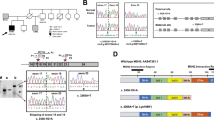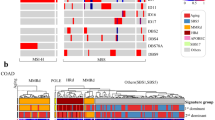Abstract
High-frequency microsatellite instability (MSI-H) results from deficiency in nucleotide mismatch repair. It contributes significantly to carcinogenesis in the human colorectal mucosa. Here we study 41 colorectal and three other HNPCC-related cancers with MSI-H to provide comprehensive information on the mechanisms of inactivation of the two major proteins involved, hMLH1 and hMSH2. Seventeen of the patients had family histories meeting the criteria for Bethesda grades 1, 2 or 3. Of these familial cases, 14 (83%) had early-onset disease, defined on the basis of diagnosis prior to the age of 50, but in three the disease was of late onset (>50 years). A second subset of 20 patients had early onset disease without family history. The remaining seven patients were selected to allow comparisons with sporadic, late-onset disease, the molecular basis of which has been extensively reported elsewhere. We stratified the tumours initially on the basis of hMLH1 or hMSH2 protein deficiency, detected by immunohistochemistry, and then by analysis of germline and somatic mutation, mRNA transcription, loss of heterozygosity (LOH) at the hMLH1 and hMSH2 loci, and methylation status in two regions of the hMLH1 promoter. The functional significance of several of these changes in the MSI-H tumours was confirmed by comparisons with 16 tumours with low-frequency microsatellite instability and 56 tumours with stable microsatellites. As anticipated, patients with family histories usually showed germline mutation of hMSH2 or hMLH1. In many cases the residual normal allele was silenced in their tumours by loss of heterozygosity (LOH). The small subset of late-onset, sporadic cases confirmed the preponderance in this group of biallelic hMLH1 promoter methylation. In the early-onset, apparently sporadic subset there were 11 tumours with hMLH1 deficiency, five with hMSH2 deficiency and four with no detectable abnormality in expression of either protein. These showed a complex mixture of lesions, including germline and somatic mutations, promoter methylation, LOH, suppression of wild-type RNA by as yet undiscovered mechanisms, or no detectable abnormality in any of these parameters. Evidence is presented to indicate that methylation in proximal region of the hMLH1 promoter is a more reliable correlate of transcriptional silencing in colorectal cancers than methylation in upstream region. These observations have significant implications for management of patients with MSI-H tumours.
This is a preview of subscription content, access via your institution
Access options
Subscribe to this journal
Receive 50 print issues and online access
$259.00 per year
only $5.18 per issue
Buy this article
- Purchase on Springer Link
- Instant access to full article PDF
Prices may be subject to local taxes which are calculated during checkout



Similar content being viewed by others
References
Chan TL, Yuen ST, Chung LP, Ho JW, Kwan KY, Chan AS, Ho JC, Leung SY, Wyllie AH . 1999a J. Natl. Cancer Inst. 91: 1221–1226
Chan TL, Yuen ST, Chung LP, Ho JW, Kwan K, Fan YW, Chan AS, Leung SY . 1999b Genes Chromosomes Cancer 25: 75–81
Chan TL, Yuen ST, Ho JW, Chan AS, Kwan K, Chung LP, Lam PW, Tse CW, Leung SY . 2001 Oncogene 20: 2976–2981
Cunningham JM, Christensen ER, Tester DJ, Kim CY, Roche PC, Burgart LJ, Thibodeau SN . 1998 Cancer Res. 58: 3455–3460
Deng G, Chen A, Hong J, Chae HS, Kim YS . 1999 Cancer Res. 59: 2029–2033
Deng G, Chen A, Pong E, Kim YS . 2001 Oncogene 20: 7120–7127
Deng G, Peng E, Gum J, Terdiman J, Sleisenger M, Kim YS . 2002 Br. J. Cancer 86: 574–579
Hemminki A, Peltomaki P, Mecklin JP, Jarvinen H, Salovaara R, Nystrom-Lahti M, de la Chapelle A, Aaltonen LA . 1994 Nat. Genet. 8: 405–410
Herman JG, Umar A, Polyak K, Graff JR, Ahuja N, Issa JJ, Markowitz S, Willson JV, Hamilton SR, Kinzler KW, Kane MF, Kolodner RD, Vogelstein B, Kunkel TA, Baylin SB . 1998 Proc. Natl. Acad. Sci. USA 95: 6870–6875
Ho JW, Yuen ST, Chung LP, Kwan KY, Chan TL, Leung SY, Chan AS, Tse C, Lam PW, Luk IS . 2000 Int. J. Cancer 89: 356–360
Kane MF, Loda M, Gaida GM, Lipman J, Mishra R, Goldman H, Jessup J, Kolodner R . 1997 Cancer Res. 57: 808–811
Konishi M, Kikuchi-Yanoshita R, Tanaka K, Muraoka M, Onda A, Okumura Y, Kishi N, Iwama T, Mori T, Koike M, Ushio K, Chiba M, Nomizu S, Konishi F, Utsunomiya J, Miyaki M . 1996 Gastroenterology 111: 307–317
Kuismanen SA, Holmberg MT, Salovaara R, de la Chapelle A, Peltomaki P . 2000 Am. J. Pathol. 156: 1773–1779
Leung SY, Chan TL, Chung LP, Chan AS, Fan YW, Hung KN, Kwong WK, Ho JW, Yuen ST . 1998 Am. J. Pathol. 153: 1181–1188
Leung SY, Yuen ST, Chung LP, Chu KM, Chan AS, Ho JC . 1999 Cancer Res. 59: 159–164
Liu B, Farrington SM, Petersen GM, Hamilton SR, Parsons R, Papadopoulos N, Fujiwara T, Jen J, Kinzler KW, Wyllie AH, Vogelstein B, Dunlop MG . 1995 Nat. Med. 1: 348–352
Peltomaki P, Vasen HF . 1997 Gastroenterology 113: 1146–1158
Rodriguez-Bigas MA, Boland CR, Hamilton SR, Henson DE, Jass JR, Khan PM, Lynch H, Perucho M, Smyrk T, Sobin L, Srivastava S . 1997 J. Natl. Cancer Inst. 89: 1758–1762
Shin KH, Shin JH, Kim JH, Park JG . 2002 Cancer Res. 62: 38–42
Tannergard P, Liu T, Weger A, Nordenskjold M, Lindblom A . 1997 Hum. Genet. 101: 51–55
Wheeler JM, Beck NE, Kim HC, Tomlinson IP, Mortensen NJ, Bodmer WF . 1999 Proc. Natl. Acad. Sci. USA 96: 10296–10301
Yuen ST, Chung LP, Leung SY, Luk IS, Chan SY, Ho JC, Ho JW, Wyllie AH . 1997 Br. J. Cancer 76: 1610–1616
Acknowledgements
We thank Mr ISH Ho and Miss KPS Cheung for excellent technical assistance, and Miss Kedo Kwan for coordination work of the Hereditary Gastrointestinal Cancer Registry. We also thank Professors Jonathan Sham and TM Wong for their support of this project. This work was supported by grants from the Research Grants Council of the Hong Kong Special Administrative Region (HKU 7330/00M, HKU 7006/99M), a donation from the Honk Kong Cancer Fund and a donation from the Hong Kong Society of Gastroenterology.
Author information
Authors and Affiliations
Corresponding authors
Rights and permissions
About this article
Cite this article
Yuen, S., Chan, T., Ho, J. et al. Germline, somatic and epigenetic events underlying mismatch repair deficiency in colorectal and HNPCC-related cancers. Oncogene 21, 7585–7592 (2002). https://doi.org/10.1038/sj.onc.1205968
Received:
Revised:
Accepted:
Published:
Issue Date:
DOI: https://doi.org/10.1038/sj.onc.1205968
Keywords
This article is cited by
-
Clinicopathological significance of deficient DNA mismatch repair and MLH1 promoter methylation in endometrioid endometrial carcinoma
Modern Pathology (2020)
-
Somatic deletions of genes regulating MSH2 protein stability cause DNA mismatch repair deficiency and drug resistance in human leukemia cells
Nature Medicine (2011)
-
Partial loss of heterozygosity events at the mutated gene in tumors from MLH1/MSH2 large genomic rearrangement carriers
BMC Cancer (2009)
-
Genome-wide copy neutral LOH is infrequent in familial and sporadic microsatellite unstable carcinomas
Familial Cancer (2008)
-
Mechanisms of inactivation of MLH1 in hereditary nonpolyposis colorectal carcinoma: a novel approach
Oncogene (2007)



